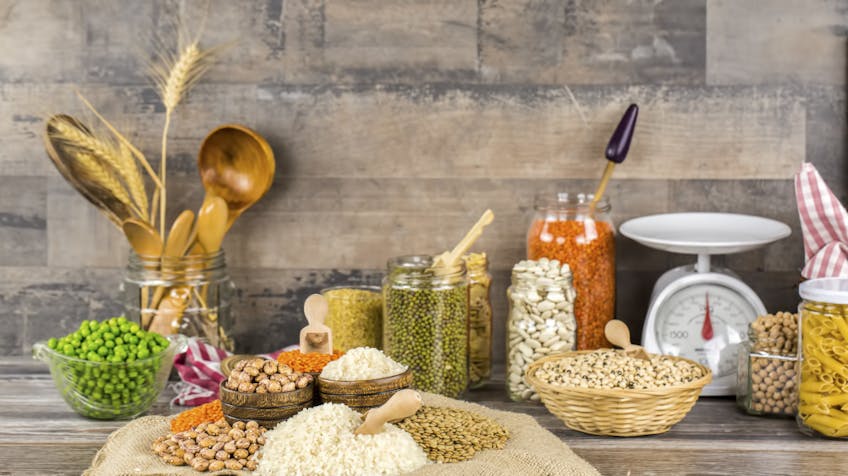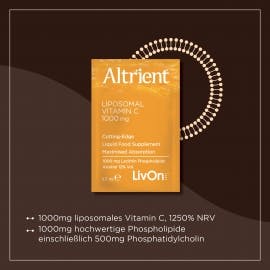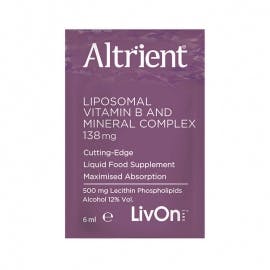Potential Pitfalls of a Vegetarian Diet
A well-balanced vegetarian diet could do wonders for your health and vitality, as scientific studies continue to reveal some of the benefits of vegetarian diets for supporting cardiovascular health, reducing some risk factors and supporting normal cholesterol levels and weight management. Wholesome vegetarian diets have been shown to provide higher intakes of dietary fibre, and complex carbohydrates, as well as magnesium, folic acid, vitamins C and E, carotenoids and a wide range of other phytonutrients.
However, it is also important to acknowledge that eliminating major food groups from the diet may go hand in hand with nutritional consequences. The abstinence of meat and fish may be linked to increased risk of some nutritional deficiencies, such us protein, iron, vitamin B12 and omega-3 deficiencies. Plant-based diets are becoming more popular, not just as a means to improving longevity and wellbeing, but also for those seeking a more consciously sustainable and environmentally friendly lifestyle. So how could one best avoid the potential nutritional pitfalls of vegetarianism?
Focus on B12
Vitamin B12 deficiency has always been a concern for those following a vegan diet, but some types of vegetarian diets may also be susceptible of nutritional deficiency of vitamin B12. There are very few plant foods that contain good levels of vitamin B12, as this vitamin is normally synthesised by certain bacteria found in the digestive tract of animals located higher in the food chain. Non-vegetarians who regularly eat meat, milk, eggs, fish and shellfish are thought to be able to maintain healthy B12 levels by diet intake alone. However, the trend towards meat-free diets and swapping cow’s milk for plant-based milks may highlight the need for a focus on B12 and alternative sources of nutritional supplementation.
In fact, a study published in the scientific journal Nutrition Review reported that approximately 62% of vegetarians may be deficient in vitamin B12. This study also revealed that vegetarians may develop B12 depletion or deficiency regardless of demographic characteristics, place of residency, age or type of vegetarian diet. The researcher suggested that people following vegetarian diets should take preventive measures to ensure adequate intake of this vitamin by supplementing their diets with B12. When choosing a supplement look for one that supplies forms of B12 that have optimal absorption such as methylcobalamin and cyanocobalamin. You could also include more foods in your diet that are naturally rich in vitamin B12 such as tempeh, nori and some mushrooms.
Why is this vitamin so important? Well, B12 is an important nutrient for the nervous system and has a role to play in cardiovascular health. Vitamin B12 also gets involved with cellular energy production and supports the formation of normal red blood cells, which transport oxygen to all cells in the body
Iron – especially important for women.
Like vitamin B12, the mineral iron also has a role in the formation of red blood cells as it forms an integral structural component of haemoglobin, the substance in red blood cell that transports oxygen around the body. Meat is by far the richest food source of iron. So, vegetarians may need to be aware of alternatives such as dark green vegetables (spinach, broccoli, watercress), blackstrap molasses, eggs, lentils, beans, cashews, prunes and pumpkin seeds. However, vegetarian alternatives may not be as rich a source of iron as meat. This mineral becomes even more important for women who suffer from heavy menstrual bleeding and supplementing with iron helps replenish iron levels. Vitamin C increases the absorption of iron, so eating foods high in vitamin C (citrus fruit, parsley) or taking an additional vitamin C supplement, at the same time as eating foods rich in iron, would be a good tip for supporting healthy iron levels in the body.
Fishy facts about omega-3
Although a vegetarian diet can be helpful for lowering your intake of harmful saturated fats, studies indicate that a vegetarian diet falls short when it comes to providing adequate levels of healthy omega-3. Unless you’re a pescatarian (vegetarian that eats fish) you may not be consuming the weekly portions of oily fish needed to sustain a plentiful supply of omega-3. Yes, there are vegetarian sources of omega-3, but many vegetarians are unaware of these omega-3 rich plant-based foods, so they may not include them in their diet. Walnuts, chia seeds, hemp seeds and flax (linseeds) all contain plant based-omega-3. Admittedly, these aren’t the easiest of foods to incorporate into the average diet. Chia and flax seeds can be added to smoothies or breakfast cereals and walnuts provide a handy veggie snack. For a quick omega-3 boost, a good tip is to swap olive oil for flax oil, hemp oil or walnut oil when making a homemade salad dressing. Blue-green algae supplements such as chlorella or spirulina may also provide a vegetarian alternative to fish oil or krill oil supplements.
Protein combining – why is this relevant?
We all need a plentiful supply of protein to provide the body with the raw ingredients needed for growth and repair of cells, tissues, organs, muscles and bones. Proteins are made up of amino acids and different foods supply different types of amino acids which contribute to different areas of the body. Meat and fish contain ‘complete’ proteins because they supply a full spectrum of essential amino acids (the ones your body can’t make and must source from food). The plant-based food revolution has meant that some vegetarians are also reducing or even eliminating from their diet’s protein-rich (cheese, yoghurt, milk, eggs). But when it comes to plant-based protein foods it’s only quinoa that has a complete protein status. It is recommended for vegetarians to pay attention to a system known as ‘protein combining’ to reduce chances of essential amino acids deficiency. Lentils, pulses and rice individually contain some (but not all) of the essential amino acids, so combining rice with pulses, or combining lentils with rice, or pulses with lentils each day, may help to ensure a more complete intake of most essential amino acids, reducing the potential risk of essential amino acid deficiencies. However, protein combining takes considerable time for meal planning, which can be hard to maintain. Protein rich seeds may also be excellent snacks for vegetarians who are falling behind on their protein combining planning!
Author
Susie Debice BSc Hons, DIP ION.
Food Scientist and Nutritional Therapist.
References
- Leitzmann C1. Vegetarian diets: what are the advantages?Forum Nutr. 2005;(57):147-56.
- Vegetarian society: Protein - https://www.vegsoc.org/info-hub/health-and-nutrition/protein/
- University of California:Vegetarian diets - https://anrcatalog.ucanr.edu/pdf/8373.pdf
- Fumio Watanabe,* Yukinori Yabuta, Tomohiro Bito, and Fei Teng. Vitamin B12-Containing Plant Food Sources for Vegetarians. Nutrients. 2014 May; 6(5): 1861–1873.
- Pawlak R, Parrott SJ, Raj S, Cullum-Dugan D, Lucus D. How prevalent is vitamin B(12) deficiency among vegetarians? Nutr Rev. 2013 Feb; 71(2):110-7.



.jpg?auto=format&q=45&w=262&trim=auto)
.jpg?auto=format&q=45&w=262&trim=auto)
